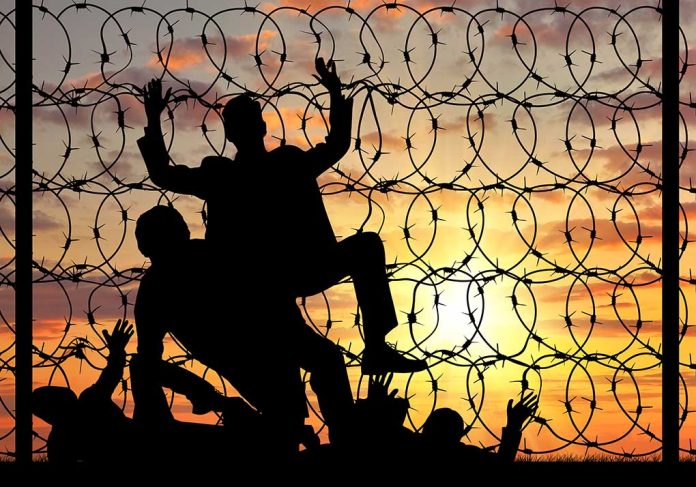
Mexican drug cartels may pose a greater threat to America than our traditional adversaries, as they amass military-grade weapons and infiltrate U.S. institutions, according to alarming insights from military expert Colonel Doug Macgregor.
Top Takeaways
- Doug Macgregor claims Mexican drug cartels pose a greater national security threat than China, Russia, or Iran
- Cartels reportedly possess advanced weapons, including Javelin missile systems near the U.S. border
- Border agents face sophisticated cartel tactics including drones, tracking devices, and operational leaks
- Some American officials are allegedly on cartel payrolls, compromising border security efforts
- Congress is being urged to expedite funding for technology and personnel to counter these escalating threats
A Greater Threat Than Foreign Adversaries
In a compelling conversation with Tucker Carlson, retired Colonel Doug Macgregor made the startling assertion that Mexican drug cartels represent a more immediate danger to American security than traditional geopolitical rivals. This assessment comes amid growing concerns about cartel capabilities, territorial control along the southern border, and their increasingly sophisticated tactical operations that directly target U.S. law enforcement personnel.
The cartels’ reported acquisition of military-grade weapons systems raises particular alarm. According to Macgregor’s claims in the interview, these criminal organizations have obtained Javelin missile systems—advanced weapons typically reserved for conventional military forces. Such weaponry would give cartels unprecedented capabilities to potentially engage American law enforcement or even military units operating near the border region. The alleged presence of these sophisticated weapons systems suggests a significant escalation in the cartels’ operational capabilities and their willingness to directly confront U.S. authorities.
Sophisticated Threat Tactics Against Border Personnel
Border Patrol and ICE agents face increasingly complex and dangerous challenges from cartel operations. Reports indicate that drug trafficking organizations employ multi-layered surveillance techniques to monitor U.S. law enforcement activities. These include deploying drones for aerial reconnaissance, utilizing wireless tracking technologies to identify agent locations, and establishing sophisticated intelligence networks that compromise operational security. The technological sophistication of these criminal enterprises has reached a point where U.S. Customs and Border Protection agents have reportedly stopped wearing body cameras due to concerns that Bluetooth signals could be intercepted and used to track their movements.
The removal of body cameras presents a secondary challenge for border security operations. Without video documentation, agents may become more vulnerable to false accusations of misconduct or excessive force. This creates a double-bind where agents must choose between operational security risks from wearing cameras and potential legal vulnerabilities from their absence. The situation demonstrates how cartel tactics are not limited to direct confrontation but extend to creating administrative and legal complications that hamper effective border enforcement.
EXCLUSIVE BREAKING NEWS – US Border Patrol has a memorandum to not use body cameras because of a threat of improvised explosive devices (from source).
Reported text of memo: "Effective Immediately until further notice, agents will cease the use of body worn cameras, Border..1/
— Ioan Grillo (@ioangrillo) February 15, 2025
Internal Corruption and Intelligence Leaks
Perhaps most concerning is Macgregor’s assertion that American officials have been compromised by cartel influence. The claim that U.S. personnel are “on the payroll” of these criminal organizations suggests infiltration of American institutions responsible for border security and drug interdiction. Such corruption, if accurate, would represent a critical national security vulnerability, allowing cartels to anticipate enforcement operations and potentially undermining America’s ability to secure its borders against drug trafficking, human smuggling, and other criminal activities.
The issue of operational leaks has become particularly troublesome for immigration enforcement efforts. Reports of advanced warning of ICE raids have repeatedly compromised operations, potentially putting agents at risk of ambush. These information breaches suggest either deliberate sabotage by compromised officials or significant operational security failings. Either scenario presents serious challenges to maintaining effective border security and enforcing immigration laws, especially in regions where cartels maintain significant influence on both sides of the border.
Congressional Action and Resources Needed
Security experts emphasize that countering the sophisticated threats posed by Mexican cartels requires a comprehensive approach backed by significant resources. Border security professionals are calling on Congress to expedite funding for advanced surveillance and counter-surveillance technologies, enhanced intelligence capabilities, and adequate personnel to address these evolving threats. Without proper equipment and staffing, border agents remain at a tactical disadvantage against well-funded criminal organizations that can rapidly adapt their operations and acquire cutting-edge technology.
The growing sophistication of cartel operations near the U.S. border represents a complex national security challenge that may require rethinking traditional defense priorities. As Macgregor suggested in his conversation with Carlson, the proximity and capabilities of these criminal organizations might now pose a more immediate threat to American security than distant geopolitical rivals. Addressing this challenge will likely require coordination across multiple agencies, sustained resource commitments, and potentially new strategic approaches to border security and drug interdiction efforts.






















